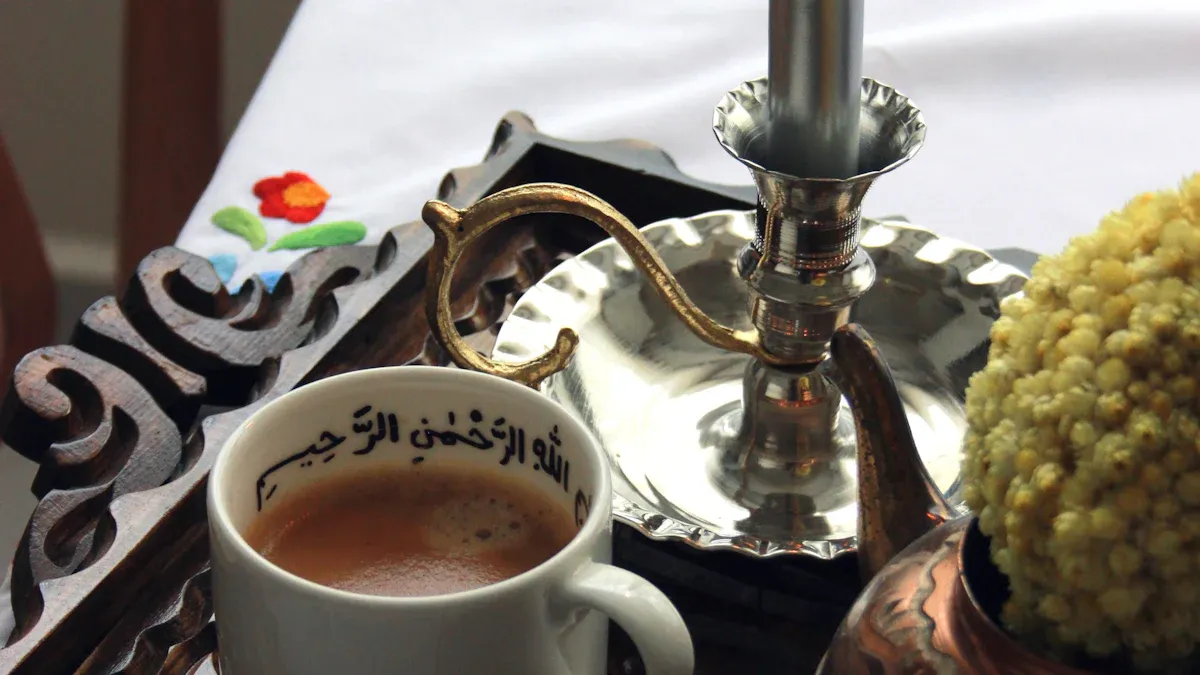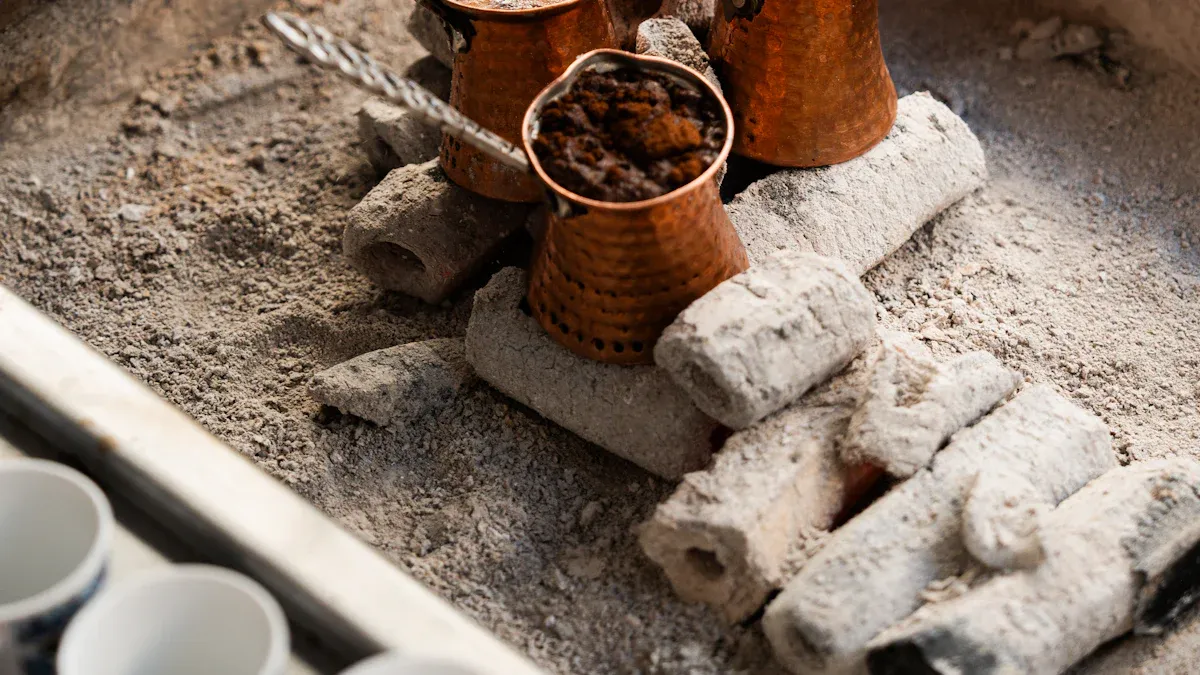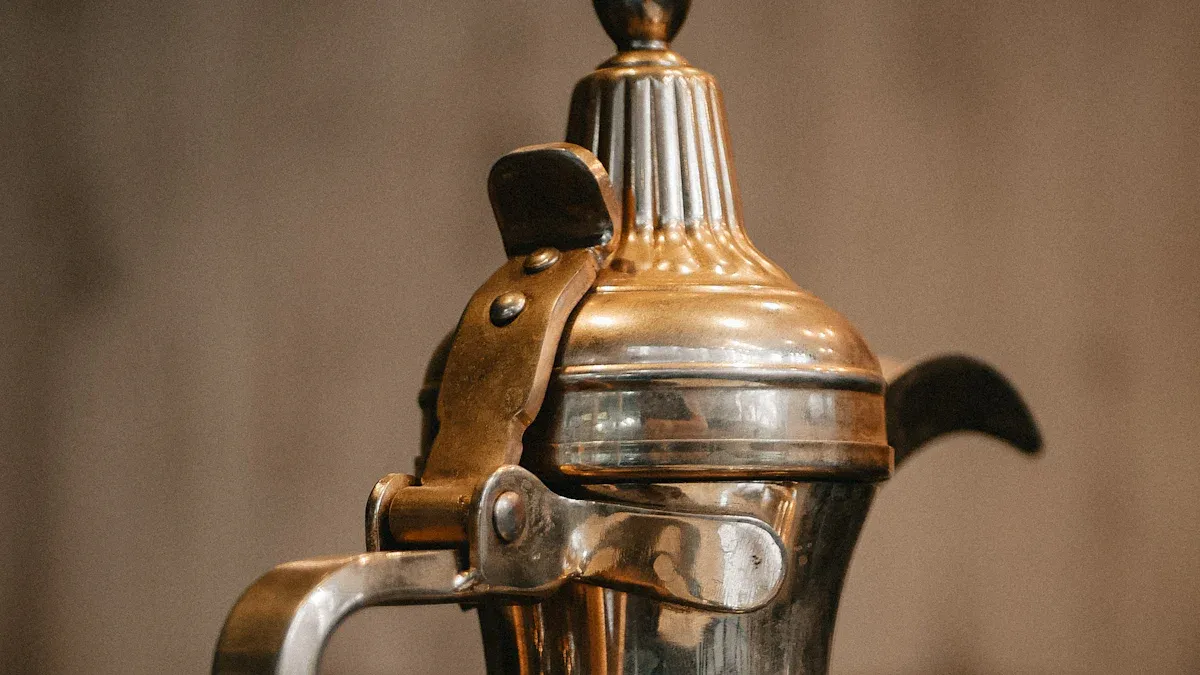
Coffee holds a special place in Middle Eastern culture, symbolizing hospitality and tradition. This deep-rooted significance has shaped the way coffee machines are designed for the region. Countries like the UAE and Saudi Arabia are witnessing a surge in coffee machine sales, driven by rising disposable incomes and urbanization. The market, projected to exceed USD 0.05 billion by 2029, reflects the growing demand for machines that cater to diverse preferences. Consumers increasingly seek devices capable of brewing both traditional Arabic coffee and specialty blends, emphasizing the need for customization. Smart, connected machines are also gaining traction, aligning with the region’s embrace of modern technology.
Key Takeaways
- Coffee represents kindness and welcome in the Middle East. It is important to know its cultural value when making coffee machines.
- New coffee machines need to copy old Arabic brewing ways. They should also use smart technology for ease and personalization.
- Coffee tastes differ a lot in the region. Machines should have settings to match various flavors and styles.
- More people now enjoy special coffee with better quality and unique tastes. This affects how machines are designed and what features they have.
- Mixing old traditions with new ideas is key. Coffee machine makers must do this to please modern, tech-loving buyers.
The Cultural Roots of Coffee in the Middle East

Coffee as a Symbol of Hospitality
Coffee has been a cornerstone of Middle Eastern hospitality for over 600 years. It serves as a traditional gesture of welcome in homes and public spaces alike. Across the region, from Algeria to Turkey, coffee consumption reflects its cultural significance, with annual consumption reaching between 4.5 million and 5 million bags. The act of serving coffee, particularly in Saudi Arabia, symbolizes honor and generosity. The Arabian coffee pot, or dallah, embodies warmth and unity, reinforcing the social practice of offering coffee as a gesture of respect.
Coffeehouses, historically known as qahwa, have played a pivotal role in fostering community ties. In cities like Istanbul, Damascus, and Baghdad, these establishments became hubs for intellectual discussions and cultural exchanges. They continue to serve as modern-day majlis al-shura, promoting collective wisdom and ethical engagement. This enduring tradition highlights coffee’s role as more than just a beverage—it is a medium for connection and cultural expression.
Traditional Arabic Coffee Preparation
The preparation of Arabic coffee is a ritual steeped in tradition. Unlike Western brewing methods, Arabic coffee involves boiling finely ground beans with water and spices such as cardamom. The process requires precision and patience, as the coffee is brewed over low heat to achieve its distinct flavor profile. The dallah plays a central role in this ritual, not only as a functional vessel but also as a symbol of hospitality and craftsmanship.
Serving Arabic coffee follows a specific etiquette. Hosts pour the coffee into small cups, often without handles, and serve it to guests in order of seniority. This practice underscores the importance of respect and social hierarchy in Middle Eastern culture. The customization of coffee machines to replicate this traditional brewing process has become increasingly important, ensuring that modern devices honor these cultural practices.
Regional Variations in Coffee Preferences
Coffee preferences in the Middle East vary significantly across regions. In the Gulf countries, gahwa—a lightly roasted coffee infused with cardamom—is a staple. In contrast, countries like Turkey and Lebanon favor darker roasts and stronger brews, such as Turkish coffee. Yemen, often regarded as the birthplace of coffee, is known for its unique qishr, a brew made from coffee husks and spices.
Urbanization and changing lifestyles have introduced new trends, including a growing demand for convenient, on-the-go coffee options. Social media and the presence of international coffee chains have further influenced consumption patterns, particularly among younger populations. Despite these modern influences, traditional preferences remain deeply rooted, highlighting the region’s ability to balance heritage with innovation.
Modern Influences on Middle Eastern Coffee Culture
The Rise of Specialty Coffee
The Middle Eastern coffee market has undergone a remarkable transformation, with specialty coffee gaining significant traction. Consumers are increasingly aware of high-quality coffee and are eager to explore diverse flavors and brewing methods. This shift reflects a growing interest in artisanal coffee experiences that go beyond traditional offerings.
The café market in the region now boasts over 16,460 branded outlets, with Saudi Arabia, the UAE, and Egypt leading this expansion. Specialty coffee shops emphasize single-origin beans, micro-roasting techniques, and sustainable practices, catering to a more discerning audience.
UAE coffee consumers prioritize value and identity over price, favoring brands that align with their aspirations. This trend has fueled the success of luxury coffee brands and sustainable initiatives.
A table highlighting the growth of specialty coffee in key markets:
| Country | Growth Rate |
|---|---|
| Morocco | 19% |
| Saudi Arabia | 16.5% |
| Egypt | 13.3% |
Global Trends and Their Impact
Global coffee trends have significantly influenced Middle Eastern coffee culture. Younger generations are embracing both traditional Arabic coffee and Western-style brews, such as espresso and cold brew. This duality reflects a blend of heritage and modernity.
- The specialty coffee market is expanding due to rising disposable incomes and a willingness to pay for premium experiences.
- Health-conscious consumers are drawn to the benefits of specialty coffee, further driving demand.
- Trends like single-origin coffees, micro-roasters, and coffee subscriptions are reshaping consumer expectations.
The growing emphasis on sustainability and technology has also impacted coffee machine customization. Consumers now seek innovative devices that align with their evolving preferences.
The Role of Coffee Shops in Modern Culture
Modern coffee shops have become cultural hubs in cities like Dubai, Riyadh, and Beirut. These spaces blend traditional coffee practices with contemporary trends, offering a unique experience for patrons.
- Specialty coffee shops focus on high-quality beans, such as Arabica and Robusta, and educate customers about coffee origins.
- Community cafes and coworking spaces are emerging, influenced by social media and technology.
- The third-wave coffee movement emphasizes artisanal preparation, fostering a deeper appreciation for coffee.
These establishments serve as gathering places, connecting coffee enthusiasts and promoting a sense of community. By bridging tradition and innovation, they play a pivotal role in shaping the future of Middle Eastern coffee culture.
Customizing Coffee Machines for Arabic Preferences

Essential Features for Brewing Arabic Coffee
Brewing authentic Arabic coffee requires machines that replicate traditional preparation methods while offering convenience. Key features include precise temperature control, adjustable brewing times, and compatibility with finely ground coffee. These elements ensure the coffee retains its rich aroma and distinct flavor. Machines designed for Arabic coffee must also accommodate the use of spices like cardamom, which are integral to the beverage’s unique profile.
To achieve the best results, consumers should prioritize coffee labeled as 100% Arabica. Freshness is critical, so selecting beans with a recent roast date enhances the flavor. Single-origin coffees, particularly from regions like Ethiopia, are highly recommended for their nuanced taste. Grinding beans at home further preserves their aroma, ensuring an authentic experience.
Tip: Look for machines with built-in grinders and customizable settings to match the specific grind size and brewing method required for Arabic coffee.
The growing demand for high-end coffee machines in the UAE highlights the importance of these features. By 2025, the coffee machine market in the UAE is expected to generate $52.74 million in revenue, with an annual growth rate of 1.66%. This surge reflects the region’s increasing preference for devices tailored to traditional and modern coffee-making needs.
Innovations in Machine Design
Manufacturers are introducing innovative designs to meet the evolving preferences of Middle Eastern consumers. Smart technology plays a pivotal role, enabling users to customize their brewing experience through mobile apps. Features like remote brewing, personalized drink settings, and user profiles enhance convenience and engagement.
| Innovation Type | Description |
|---|---|
| Smart Technology | Mobile apps allow users to control brewing remotely and adjust settings. |
| Customization Features | Machines offer tailored brewing options, including spice infusion settings. |
| User Profiles | Devices store individual preferences for multiple users. |
Modern machines also incorporate advanced brewing techniques to replicate traditional methods. For example, some models mimic the slow boiling process of Arabic coffee, ensuring the final product matches the rich, full-bodied flavor of the traditional brew. Built-in spice dispensers and temperature sensors further enhance the authenticity of the brewing process.
The rise of specialty coffee has also influenced machine design. Consumers now seek devices that cater to artisanal brewing methods, emphasizing quality and sustainability. This trend has driven manufacturers to innovate rapidly, introducing versatile machines that blend tradition with modernity.
Addressing Challenges in Customization
Customizing coffee machines for Arabic preferences presents unique challenges. One major hurdle is balancing traditional brewing techniques with modern convenience. Machines must replicate the intricate process of preparing Arabic coffee while remaining user-friendly. Achieving this balance requires advanced engineering and a deep understanding of cultural practices.
Another challenge lies in catering to diverse regional preferences. While Gulf countries favor lightly roasted coffee with cardamom, other regions prefer darker roasts or unique brews like Yemen’s qishr. Designing machines that accommodate these variations requires versatility and adaptability.
| Challenge | Solution |
|---|---|
| Balancing Tradition | Incorporate features that replicate traditional methods, like slow boiling. |
| Regional Preferences | Offer adjustable settings for roast levels, grind sizes, and spice infusion. |
| Consumer Expectations | Focus on user-friendly interfaces and smart technology integration. |
Despite these challenges, the market continues to grow. By 2030, the coffee machine market volume in the UAE is projected to reach 369.99k pieces. This growth underscores the importance of addressing customization needs to meet consumer expectations.
Note: Manufacturers must prioritize cultural sensitivity and technical innovation to create machines that honor tradition while embracing modern trends.
Balancing Tradition and Modernity in Machine Design
Preserving Cultural Identity
Coffee machines designed for the Middle Eastern market must honor the region’s rich cultural heritage. Traditional Arabic coffee preparation involves intricate rituals, from the use of the dallah to the precise brewing process. Machines that replicate these methods help preserve cultural identity while offering modern convenience. Features such as slow boiling, spice infusion settings, and compatibility with finely ground coffee ensure that the essence of Arabic coffee remains intact.
Manufacturers also focus on aesthetics to reflect cultural values. Machines often incorporate design elements inspired by traditional motifs, such as geometric patterns or gold accents, which resonate with local consumers. These visual cues not only enhance the product’s appeal but also reinforce its connection to Middle Eastern traditions.
The growing popularity of specialty coffee shops in the region highlights the importance of cultural preservation. These establishments often blend traditional practices with modern trends, creating a unique experience that appeals to both older and younger generations. Coffee machines that align with this duality play a crucial role in maintaining the balance between heritage and innovation.
Catering to a Tech-Savvy Generation
The Middle East’s younger population is driving demand for advanced coffee machines with innovative features. Recent statistics reveal that tech-savvy consumers increasingly seek devices offering convenience, customization, and premium experiences. Smart technology, such as touchscreens and Wi-Fi connectivity, has become a standard expectation. These features allow users to control brewing remotely, adjust settings, and even save personalized preferences.
In urban areas, where coffee culture is rapidly evolving, the adoption of automated machines is on the rise. Devices equipped with user-friendly interfaces and app integration cater to the fast-paced lifestyles of younger consumers. For instance, some machines enable users to schedule brewing times or select specific brewing methods, ensuring a seamless experience.
This trend reflects a broader shift in consumer behavior. As younger generations embrace both traditional and modern coffee practices, manufacturers must innovate to meet their expectations. Machines that combine advanced technology with traditional brewing capabilities offer the perfect solution, bridging the gap between past and present.
The Future of Coffee Machines in the Middle East
The Middle Eastern coffee machine market is poised for significant growth, driven by changing consumer preferences and urbanization. Several trends and predictions highlight the evolution of this market:
- The increasing westernization of beverage consumption habits is influencing coffee machine designs.
- Saudi Arabia remains the largest market, while South Africa shows rapid growth potential.
- International brands are expanding their presence, introducing premium machines tailored to local tastes.
- Automated coffee machines are gaining popularity as traditional brewing methods shift toward modern techniques.
- The hospitality sector continues to drive demand for professional-grade machines.
- Rising disposable incomes in urban areas support the adoption of high-quality coffee machines.
These developments underscore the importance of customization in machine design. By incorporating features that cater to diverse preferences, manufacturers can address the needs of a dynamic market. The future of coffee machines in the Middle East lies in their ability to balance tradition with modernity, ensuring that cultural practices are preserved while embracing technological advancements.
Note: The Middle Eastern coffee market exemplifies how innovation and tradition can coexist. As manufacturers continue to innovate, they must remain mindful of cultural nuances to create products that resonate with local consumers.
The Middle East’s coffee culture exemplifies the delicate balance between tradition and modernity. Coffee has been a cultural cornerstone for centuries, with traditional servers like the dallah still widely used. However, the region’s growing embrace of technology highlights a shift toward modern practices. Customized coffee machines play a pivotal role in preserving these traditions while meeting contemporary demands. Features that replicate traditional brewing methods alongside smart technology ensure cultural practices remain intact.
- Coffee culture predates modern chains, reflecting deep-rooted traditions.
- Traditional brewing methods coexist with modern innovations, showcasing a harmonious blend.
This balance underscores the importance of cultural and technical harmony in shaping the future of coffee machine design.
FAQ
What makes Arabic coffee different from other types of coffee?
Arabic coffee stands out due to its unique preparation method and use of spices like cardamom. It is typically brewed lightly roasted and finely ground, resulting in a distinct flavor profile. The serving etiquette, which emphasizes hospitality and respect, further differentiates it from other coffee traditions.
Can modern coffee machines replicate traditional Arabic coffee preparation?
Yes, modern coffee machines can replicate traditional methods by incorporating features like slow boiling, spice infusion, and precise temperature control. These innovations ensure the coffee retains its authentic flavor while offering convenience for users who value both tradition and modernity.
Are coffee machines with smart technology popular in the Middle East?
Smart coffee machines are increasingly popular, especially among younger, tech-savvy consumers. Features like app integration, remote brewing, and personalized settings cater to the region’s growing demand for convenience and customization, aligning with modern lifestyles and preferences.
How do coffee machines address regional variations in preferences?
Manufacturers design machines with adjustable settings for roast levels, grind sizes, and spice infusion. This versatility allows users to prepare beverages like Gulf-style gahwa or Yemen’s qishr, ensuring the machines meet diverse regional tastes while maintaining authenticity.
What role does sustainability play in coffee machine design?
Sustainability has become a key focus in coffee machine design. Many manufacturers now prioritize energy-efficient models, recyclable materials, and support for ethically sourced coffee. These efforts align with the growing consumer demand for environmentally responsible products in the Middle East.
Post time: Apr-15-2025
